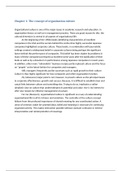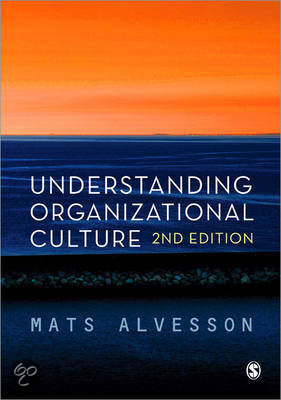Chapter 1: The concept of organization culture
Organizational culture is one of the major issues in academic research and education. In
organization theory as well as in management practice. There are good reason for this: the
cultural dimension is central in all aspects of organizational life.
At the beginning of the 1980s books identifying characteristics of excellent
companies in the USA and the secrets behind the at-the-time highly successful Japanese
companies highlighted corporate culture. These books, in combination with journalistic
writings created a widespread belief in corporate cultures being perhaps the significant
factor behind the performance of companies. This belief has been shaken by problems in
many of these companies portrayed as excellent some years after the publication of their
book as well as by a downturn in performance among Japanese companies in recent years.
In addition, other more “rationalistic” business recipes partly replaced culture and the focus
on “people” as the latest fashion for companies and managers.
Still, managers frequently ascribe successes such as rapid growth to their culture.
Culture is thus highly significant for how companies and other organization function.
My (Alvessons) major point is not, however, to preach culture as the principal means
to corporate effectiveness, growth and success. Because, it is difficult to establish clear and
casual links between culture and something else. Trying to do so, implicates a rather
simplistic view on culture that underestimates its potential and value. Nor is my interest to
offer new recipes for effective management of culture.
For me (Alvesson), organizational culture is significant as a way of understanding
organizational life in all its richness and variations. The centrality of the culture concept
follows from the profound importance of shared meaning for any coordinated action: A
sense of common, taken for-granted ideas, belief and meanings is necessary for continuing
organized activity. This makes interaction possible without constant confusion or intense
interpretation and reinterpretation of meanings.
,The Meaning(s) of Culture
Culture has no fixed or broadly agreed meaning even in anthropology, but variation in its use
is especially noticeable in the literature on organizational culture. This is partly related to:
1. Strong differences in the purpose and depth of books and articles on organizational
culture.
2. Broad variations of scientific disciplines and research orientations involved in
organization culture studies.
Culture is, however, a tricky concept as it is easily used to cover everything and consequently
nothing. Most of the diverse perspectives on culture share the following assumptions about
cultural phenomena:
1. They are related to history and tradition
2. They have some depth, are difficult to grasp and account for and must be interpreted
3. They are collective and shared by members of groups
4. They are primarily ideational in character, having to do with meaning, understanding,
beliefs, knowledge and other intangibles.
5. They are holistic, intersubjective and emotional rather than strictly rational and
analytical.
Viewing culture as: a shared and learned world of experiences, meanings, values, and
understanding which informs people and which are expressed reproduced and
communicated partly in symbolic form, is consistent with a variety of approaches to the
conduct of concrete studies,
I use the term organizational culture as a umbrella concept for a way of thinking
which takes a serious interest in cultural and symbolic phenomena. Definition of
organizational culture: Talking about organizational culture seems to mean talking about
importance for people of symbolism ( rituals, myths, stories and legends) and about the
interpretation of events, ideas, and experiences that are influenced and shaped by the group
within which they live. I will also, however take organizational culture to include, values and
assumptions about social reality.
Culture is then understood to be a system of common symbols and meanings. It
provides the shared rules governing cognitive and affective aspect of membership in an
organization, and the means whereby they are shaped and expressed.
Culture is not primarily “inside” people’s heads, but somewhere “between” the
heads of a group of people where symbols and meanings are publicly expressed.
It is important here not to overemphasize the static element of culture: even if
,tradition, framework, rules and fairly stable meanings are part of the picture, culture is not
best understood as a homogeneous, cohesive and casual force, but as something that
people do; it is emergent, dynamic, situationally adaptive and co-created in dialogue.
Key concept of culture: Symbols and Meanings
Even though there are a number of concepts of significance for a cultural understanding
( assumptions, beliefs, rites, rituals, myths, identity and values) I see symbols and meanings
as the most significant ones.
Meaning refers to how an object or utterance is interpreted. It points at what
something is seen as standing for. Meaning makes an object relevant and meaningful. The
exact meaning the rule/object, however calls for interpretation – and this is where culture
comes in. We can imagine different organizational cultures in which the same rule is given
very different meanings and thus leads to different behaviors and consequences of the rule.
In a cultural context it is always socially shared meanings that are of interest, not so
much highly personal meanings. Individual meanings are certainly important and they may
vary considerably within a group. But a cultural understanding concentrates not on
individual idiosyncrasies: it is the shared orientation within an organization or another group
that is of interest.
A symbol can be defined as an object – a word or statement, a kind of action or a
martial phenomenon – that stand ambiguously for something else and/or something more
than the object itself. A symbol is rich in meaning – it condenses a more complex set of
meanings in a particular object and thus communicates meaning in an economic way.
When thinking about culture is it important to bear in mind what culture is not, that
is, what a cultural perspective does not focus on. Culture is regarded as a more or less
cohesive system of meanings and symbols, in terms which social interaction takes place.
Social structure is regarded as the behavioral patterns which the social interaction itself
gives rise to. In the case of culture, then, we have a frame of reference of beliefs, expressive
symbols and values, by means of which individual define their environment, express their
feelings and make judgements. At the social structural level, we have a continuous process
of interaction. Culture is the creation of meaning through which human beings interpret
their experiences and guide their actions, while social structure is the form which action
takes or the network of social relationships which actually exist.
What culture is not
This means that culture and social structure represent different abstractions of the same
phenomenon. Culture describes social action as depending on the meaning it has for those
, involved, while social structure describes social action from the point of views of its
consequences on the functioning of the social system. This understanding permits treatment
of the tension arising between culture and the social structure. Discontinuity between social
and cultural structures can occur, for example, when there is a change in formal rule or
routines which is not matched by a change in culture. Studying culture is there for not the
same as studying social structure.
The broad relevance of a cultural perspective
The point is that culture research concentrates on meanings anchored and transmitted in a
symbolic form. Culture meanings guide thinking, feeling and acting. It is thus difficult to
argue that culture is not important. It may be argued that culture denotes something too
vague and broad to be very useful, but cultural analysis is more delimited and precise as it is
directed at specific phenomena: How people think strategically, how they interpret and
respond to the acts of superior, how they understand the customer. It is then not culture per
se, as a specific object, but the shared meanings of a specific phenomenon that are
addressed. Culture is a perspective rather than a robust object.
Some comments on the contemporary interest in organizational culture
It seems reasonable to point to a set of factors of development to make sense of the
increased interest in culture, especially in the 1980s. The exaggerated view of corporate
culture as a universal tool for competitiveness and excellence was due partly to the fertile
ground created by the boom experienced by Japanese companies and the corresponding
difficulties for US and other Western economies at that time, and partly due to the skillful
exploitation of pop-management authors and consultants.
There are however a mix of more substantive and lasting reasons for the ongoing
interest in organizational culture: for many academic researches it arises from theoretical
concern ; The culture concept also has the advantage that is seems to provide a conceptual
bridge between micro and macro levels of analysis and between organizational behavior and
strategic management ; Changes in production technology and/or work organization recent
decades may also have been important in bringing the cultural dimension into a sharper
focus; the expansion of high-tech and other knowledge-intensive companies employing a
large number of professionals whose loyalty is crucial also contributes to the recognition of
the significance of culture in management ; it is also possible that organization these days do
not automatically produces “enough” local culture.





